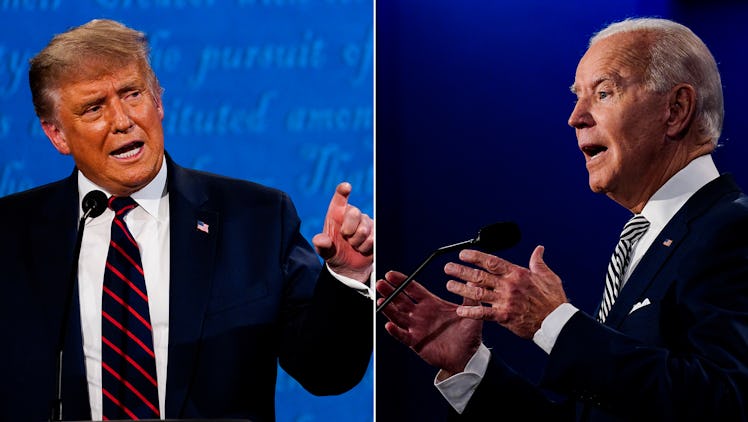
The Second Presidential Debate Is A Big Mess A Week Before It Even Starts
With Oct. 15 only a week away, there's still plenty of uncertainty around the second presidential debate — including if it'll even happen. After President Donald Trump's Oct. 1 coronavirus diagnosis, many are wondering if he's is well enough to take part in a verbal sparring match, even after a weekend of high-level treatment. With so much doubt and mystery surrounding the current POTUS' health, one question remains: Will Trump and Biden have a second presidential debate? At this point, who even knows?
Following Trump's COVID-19 diagnosis, on Oct. 8, the Commission on Presidential Debates, which organizes the debate schedule and format, announced the Oct. 15 debate would be conducted virtually "in order to protect the health and safety of all involved.” The second debate was planned as a town hall event. Although the Biden campaign immediately agreed to the change of plans, Trump appeared less happy. In an Oct. 8 interview with Fox News, Trump stated: "I’m not going to waste my time on a virtual debate, that’s not what debating is all about. You sit behind a computer and do a debate — it’s ridiculous.” Chief Trump campaign officials stated to Fox News that they had not been told beforehand about the Debate Commission's decision to facilitate a virtual face-off.
In a statement shared with Elite Daily, Biden's deputy campaign manager and communications director, Kate Bedingfield, called on the Debate Commission to move the Biden-Trump Town Hall to Oct. 22, "so that the President is not able to evade accountability." The statement added, "every Presidential candidate since 1992 has participated in such an event, and it would be a shame if Donald Trump was the first to refuse." Bedingfield also said that if the debate did not continue as planned, Biden would "find an appropriate place" and method to take questions directly from voters.
Since the last debate was such a hot mess, a virtual debate could be much more civil — as it would presumably be easier to mute candidates' mics to pare down responses and interruptions. Barely 30 minutes into the previous presidential debate, Trump had already interrupted Biden so many times that Biden became visibly frustrated, eventually saying "will you shut up, man?" Additionally, it would be much easier to track the president's inaccurate claims.
During the previous debate, fact-checkers revealed that while Biden was for the most part, accurate in his claims, Trump was factually incorrect in almost every comment he made — from drug prices and travel restrictions to football and voter fraud. While this may come as no surprise to viewers, the sheer amount if inaccuracies the president spouts is largely unprecedented. In an Oct. 7 report from PolitiFact, researchers found that a whopping 84% of Trump's recent statements at the previous debate were either half true, false, mostly false, or "pants on fire" false. He also drew enormous controversy for his refusal to clearly and unequivocally denounce white supremacy, which horrified viewers.
Shortly after Trump said he did not want to do a virtual debate, the Trump campaign called to push the debate schedule back by a week instead, per Reuters reporter Steve Holland. The Trump campaign reportedly requested to hold in-person debates on Oct. 22 and Oct. 29.
With so much uncertainty still hanging in the air, who knows what's to come? Either way, Election Day can't be rescheduled or moved — so get ready for Nov. 3.